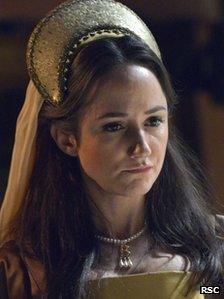Wolf Hall theatrical production delights critics
- Published

Miles has received glowing reviews for his role as Thomas Cromwell
The theatrical versions of Hilary Mantel's historical novels Wolf Hall and Bring Up the Bodies have earned rave reviews from critics.
In a five-star review in the Times, Dominic Maxwell called Wolf Hall "a rollicking yarn that gives a vivid sense of how it might have felt to be at the heart of the Tudor court".
The Booker Prize winners have been adapted by Mike Poulton, and performed by the Royal Shakespeare Company.
Both plays last more than three hours.

Lydia Leonard's Anne Boleyn is likened to a "sharp-toothed vixen"
"Poulton has done an outstanding job in turning the books into two epic three-hour plays that, in Jeremy Herrin's RSC production, make for a gripping piece of narrative theatre," wrote The Guardian's Michael Billington, external in another favourable review.
"Watching the two plays together over a span of six hours is an occasionally exhausting but mostly exhilarating experience. There is a vast amount of skill involved."
The plays, which are running concurrently at the RSC's Swan Theatre at Stratford upon Avon, will be performed side by side on most matinee days.
The 21-strong cast, some playing dual roles, is led by Ben Miles as central character Thomas Cromwell, who is praised by Maxwell for his "unshowy, perfectly judged performance".
"I loved the novel of Wolf Hall and did not think anyone could satisfy the private idea I had of Cromwell, but Mr Miles does just that," added Quentin Letts, external, writing in the Daily Mail.
"Here is a groaning banquet of political shenanigans and deadly intrigue, with Nathaniel Parker's King Henry suitably bearded, barrel-chested and sporting a dandy pair of stockinged calves," wrote Letts.
Maxwell concludes there are "no weak links" in the cast, while Nathaniel Parker, as Henry VIII, Paul Jesson, as Wolsey, and Lydia Leonard, as Anne Boleyn are all singled out for praise.

Nathaniel Parker plays the capricious Henry VIII
Charles Spencer, external, writing in the Telegraph, had some caveats about the production, citing John Ramm's portrayal of Thomas More as "a nerdy creep" as "unnecessary" and complaining that watching the productions over a six-hour period "sometimes feel[s] like one damn thing after another".
However, he concludes "this Tudor double-bill is at best splendidly entertaining and at times deeply touching".
"A triumph of storytelling in one medium has become a triumph of storytelling in another," summed up Maxwell in the Times.
"While they can't precisely reproduce the dream-like richness of Mantel's prose, they show that novels can sometimes be made into very good plays," echoed Billington.
- Published25 October 2013
- Published4 July 2013
- Published8 March 2013
- Published7 January 2013